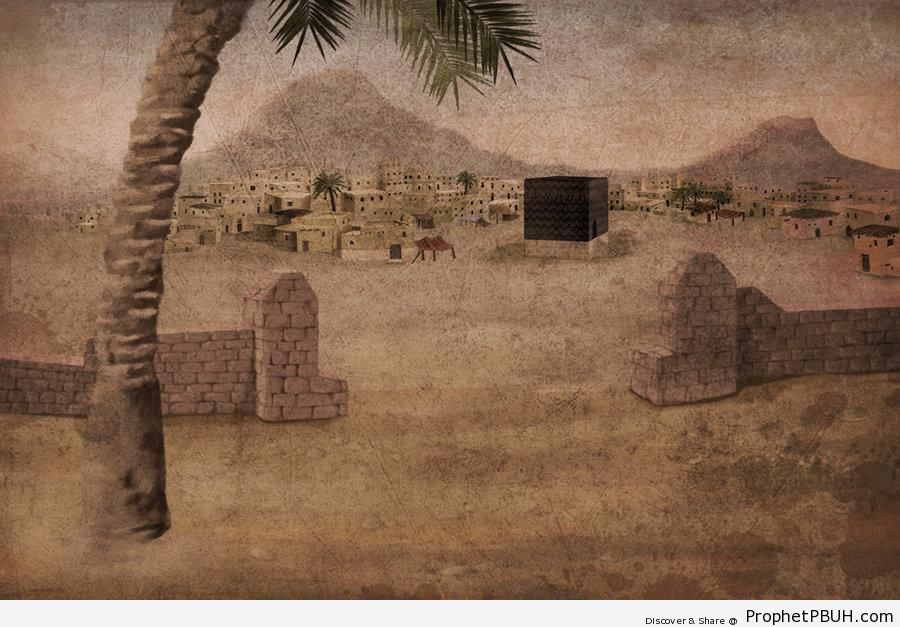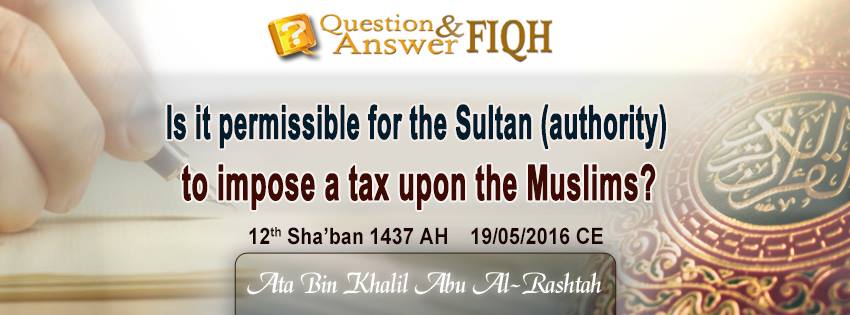There is a difference of opinion amongst scholars regarding whether the Khalifah has to be from the lineage of the Quraysh. Both are valid opinions and proponents of both sides have put forward detailed evidences to support their respective views. This brief article looks at some of the reasons for disagreement on this issue and how this disagreement may be conceived of from an Usooli perspective.
Those who take Qurayshi lineage to be a mandatory condition for the Khalifah rely primarily on a number of authentic ahadith, such as the below:
إن هذا الأمر في قريش
“Verily this matter is within Quraysh…”لاَ يَزَالُ هَذَا الأَمْرُ فِي قُرَيْشٍ مَا بَقِيَ مِنَ النَّاسِ اثْنَانِ
“This matter would still be within Quraysh even if only two of them remained.”
Those who do not hold the opinion that Qurayshi lineage is mandatory for the Khalifah primarily rely on the fact that these ahadith are informative, not imperative. According to them, these texts do not contain a decisive command which establish the obligation of the Khalifah being from the Quraysh.
We elaborate on one of the arguments that Sheikh Taqi Uddin al-Nabhani (RA) presents in his book The Ruling System in Islam to support his view that it is not mandatory for the Khalifah to be from the Quraysh. He does present a number of arguments but we discuss only one as it requires some explanation. He writes:
“…the word Quraysh is a name and not a description. In Shari’ah terminology it is known as a title. And the meaning derived from the title is never considered, because the title has no meaning (Mafhoom) at all. Therefore, the mention of Quraysh does not mean that the position of ruling cannot belong to other than Quraysh. So when Allah’s Messenger (saw) said:
“Verily this matter is within Quraysh…” and his saying:
“This matter would still be within Quraysh…” he (ﷺ) did not mean that it is wrong for it (the ruling) to be in other than Quraysh. He (ﷺ) meant that it is within Quraysh and, as well, it is valid to be in the hands of others who are not from Quraysh. Thus specifying the people of Quraysh as rulers does not necessarily mean that others are not valid to rule. Therefore, it is a condition of preference and not a contractual condition.”
To understand this point we need to first understand a few points on Usool ul Fiqh. Usooli scholars classify textual implications (al-dalalat) in a number of ways. One way of classifying them is by dividing them into mantuq and mafhum.
Mantuq is what is directly understood from the uttered words of the text, e.g. we understand the obligation of fasting in Ramadan directly from the below ayah:
…So those of you who witness the month must fast in it… [Baqarah:185]
Mafhum refers to the implied meaning of the text that is not directly indicated by its wording, but is arrived at by inference, e.g. the ayah below literally prohibits saying “uff” to parents but it also implies prohibition of anything greater than saying “uff” such as verbal of physical abuse:
Do not say to them ‘Uff’ [Isra: 23]
The mafhum is further divided into two sub-categories:
1. Mafhum al-Muwafaqah
2. Mafhum al-Mukhalafah
Mafhum al-Muwafaqah is an implied meaning that is in harmony with the pronounced meaning (dalalat al-mantuq). For example, the implied prohibition of abusing one’s parents derived from the verse from Surah Isra quoted above is in harmony with the mantuq that prohibits saying “uff” because both the mantuq and the mafhum in this case are conveying prohibitions.
Mafhum al-Mukhalafah is an implied meaning that diverges from the pronounced meaning (dalalat al-mantuq). Sh Al Nabhani writes in his book on Usool ul Fiqh, Islamic Personality volume 3:
…the Messenger (ﷺ) said, “Delaying (to pay back) the debt payment by al waajid (he who is able to pay); allows his honor and his penalty” [Abu Daawood].
Al waajid is the rich, his procrastination is his delay, allowing his honor is requesting him to pay, and his penalty is imprisoning him, so the connotation of incompatibility [mafhum al-mukhalafah] in it is that these things are not allowed to do to other than the rich. So the messenger (ﷺ) meant by this Hadeeth that the honor and the penalty of other than the rich are not allowed.
In contrast to mafhum al-muwafaqah, mafhum al-mukhalafah establishes the opposite ruling to the dalalat al mantuq, i.e., in the example above, the mantuq establishes permissibility of certain actions against the rich person who delays debt repayments, but the mafhum al-mukhalafah establishes prohibition of those same actions against the poor person.
Scholars lay down certain stringent conditions for mafhum al-mukhalafah before a ruling can be taken from it e.g. a ruling cannot be derived from mafhum al-mukhalafah that is negated by the Qur’an or Sunnah. Without going into these conditions in detail, let us only look at those that will help us understand the issue at hand.
Sh Abdul Wahhab Khallaf (RA) explains in his book ‘Ilm Usool ul Fiqh the different types of mafhum al mukhalafah, the ones which the scholars agree are valid, the ones that they agree are invalid, and the ones where there is a difference of opinion.
He writes that mafhum al mukhalafah are of five types in accordance with the manner in which the mantuq of the text is qualified:
1. Mafhum al wasf (Implication of the attribute)
2. Mafhum al ghayah (Implication of the extent)
3. Mafhum al shart (Implication of the condition)
4. Mafhum al ‘adad (Implication of the stated number)
5. Mafhum al laqab (Implication of the title/name)
Explaining each of the above is beyond the scope of this article, but we have already seen an example of mafhum al wasf before, which is the hadith quoted above regarding the rich person delaying debt repayment. The ruling in the text is related to the person being rich. And the “rich” here is an attribute (sifah).
Likewise, mafhum al mukhalafah can be derived from the extent, condition, number, or a name/title that qualifies a text. This should suffice for our purposes as long as we have a basic understanding of the fact that a text can be qualified by one of the five types of qualifications mentioned above. However, a bit of elaboration is required for the fifth type, mafhum al laqab, which is of the most relevance to us.
Sh Khallaf says that the scholars agree that mafhum al mukhalafah derived from the laqab cannot be used to derive a ruling. Laqab is a noun (ism) or a proper noun. Explaining this point, Sh Al Nabhani gives the below examples:
The example “Zaid is standing up” does not denote the banishment of the standing up of other than Zaid, and the example “there is Zakaat in the sheep” does not denote the banishment of the Zakaat in other than the sheep.
In the above examples, “Zayd” is a proper noun and “sheep” is a generic noun. Therefore, as agreed upon by all scholars, mafhum al-mukhalafah cannot be taken from these nouns, which means that we may not conclude from the above sentences that no one else apart from Zayd is standing, nor that no other animals apart from sheep have zakat due on them.
This principle has very significant implications on the understanding derived from the ahadith that are used as evidence to prove that only the Quraysh are eligible to be the Khalifah. As Sh Al Nabhani mentions, the term “Quraysh” is a title (laqab). Therefore, mafhum al mukhalafah cannot be used in this instance to derive a ruling. So the ahadith on leadership belonging to the “Quraysh” does not negate the validity of leadership for other than the Quraysh. Hence, the requirement of Qurayshi lineage cannot be established as a necessary condition for the Khalifah from these ahadith according to this view.
Furthermore, Sh Khallaf mentions that while the scholars agree that it is valid to derive mafhum al mukhalafah from the qualifications of sifah (attribute), ghayah (extent), shart (condition) and ‘adad (number), they disagree on whether this can be applied to revealed texts (Qur’an and Sunnah).
He says that the majority of Usooli scholars accept the applicability of mafhum al mukhalafah from the above-mentioned four kinds of qualifications to revealed texts but the Hanafi scholars disagree and hold that mafhum al mukhalafah can only be applied to non-revealed texts such as, sayings of men, expressions of authors, the technical/conventional usage of language by jurists etc.
In fact, Hanafis have a different way of classifying textual implications (al dalalat) altogether to what has been described so far regarding the mantuq and the mafhum. While there are overlaps between Hanafi classifications and other schools, mafhum al mukhalafah is not part of the four categories of textual implications that Hanafis use.
Therefore, scholars restricting the validity of mafhum al mukhalafah to non-revealed texts would have further reasons not to take the mentioned ahadith as establishing prohibition for the non-Quraysh from being the Khalifah.
Given the above, we can see how the issue of the Khalifah being from the Quraysh is not as straight forward as some make it out to be. As mentioned above, both are valid opinions and the difference of opinion on this issue is an acceptable difference within Islam.
The question now arises how then would those who hold Qurayshi lineage to be a mandatory condition accept a non-Qurayshi as a Khalifah if the situation so arises. Arguably the answer to that lies in the fact that regardless of which position one holds, one needs to accept the fact that this issue is one where there is a valid difference of opinion. And, as we know, one of the conditions of enjoining good and forbidding evil is that there be no valid difference of opinion on the issue.
A non-Qurayshi becoming a Khalifah is not necessarily a munkar that needs to be changed with the hands, the tongue or the heart. Therefore, we did not see our scholars rise up in arms when the Khilafah transferred to other than the Quraysh in the past. Scholarly debate about the issue can continue, but it cannot be a cause of political division amongst the Ummah.
From The Islamic Personality, Volume 2
For the sake of completeness, we extract below a useful passage from one of the Hizb’s adopted books, Islamic Personality 2, and what it contains of an argument in regards to this particular issue:
No evidence including a decisive demand was reported other than these seven conditions (regarding the Khalifah outlined in the book), so they are alone the conditions of contract. Other conditions included in sound evidences are conditions of preference only. Therefore, it is not a condition of contract to the Khilafah that the Khaleefah must be a mujtahid because there was no sound text on the matter, and also because the duty of the Khaleefah is to rule and he does not necessarily need to make ijtihad since he can inquire about the hukm, follow a mujtahid and adopt laws according to the opinion of that mutjahid. It is therefore not necessary for him to be a mujtahid, although it is preferable; but if he were not a mutjahid, the Khilafah would still be contracted to him.
Also, it is not a contracting condition to the Khilafah that the Khaleefah must be brave, or of the people of good vision to manage the affairs of the community and to conduct its interests. This is so because no sound hadith was reported on this issue and it does not come under a hukm shari’ which makes it a contracting condition; although it is preferable that the Khaleefah be brave and of deep insight and vision.
Further, it is not a contracting condition to the Khilafah that the Khaleefah must be of Quraish. As for what reported from Mu‘awiya (RA) was that he said: I heard the Messenger of Allah (ﷺ) saying:
This matter is in Quraish. None will dispute with them while they establish the deen except that 21 Allah will drag him on his face (Al-Bukhari).
And as for the narration where ibn ‘Umar said:
The Prophet (ﷺ) said: “This matter will remain in Quraish as long as there are even two of them existing.”
These ahadith and others which were correctly/soundly ascribed to the Prophet (ﷺ) about making the Khilafah to Quraish came in an informative form, and not a single one of them came in the command form. The informative form, although it indicates a request, is not considered a decisive request unless it was associated with a connotation which indicates the confirmation; and these informative forms were not associated with any connotation which indicates confirmation/emphasis (tawkeed) in any sound narration.
So these ahadith indicate that it is a recommendation and not an obligation; thus it is a condition of preference not a contracting condition per se. As for his his saying in the hadith “None will dispute with them except that Allah will drag him on his face” this is another meaning in prohibiting their enmity and not a confirmation to his saying “this matter is in the Quraish.” The hadith states that the matter is in the Quraish, and that their enmity is prohibited.
Moreover, the word “Quraish” is a name and not an adjective and in the terminology of usul (principles of fiqh) it is called a title (laqb). The meaning of the name i.e. the meaning of the title is not acted on at all, because the name i.e. the title carries no understanding/perception (la mafhum lahu).
Therefore the statement about Quraish does not mean that it cannot be in other than Quraish. So the saying of the Prophet (ﷺ) “this matter is in Quraish” and “this matter will remain in Quraish” does not mean that it is illegal for the Khaleefah to be from other than Quraish nor (does the saying) that the leadership remain in Quraish mean that it invalid for it to be in other than them. Rather the implication is that (for some time it will be) in them and it is valid to be in other than them. Thus the statement about them does not prevent the Khaleefah to be in other than them. Accordingly, this is a condition of preference and not a condition of contract.
Additionally, the Messenger of Allah (ﷺ) did appoint as leaders ‘Abdullah bin Ruwaha, Zaid bin Haritha, and Usama bin Zaid, and all of them were not from Quraish. Thus the Messenger gave leadership to people other than Quraish. The word “this matter” means the authority i.e. the rule and it is not restricted in the Khilafah alone. We can conclude therefore that since the Messenger (ﷺ) appointed other than Quraish in the ruling then this is an evidence that ruling is not restricted to them and not prevented from people other than them. So these ahadith stated some of the people who are eligible for the Khilafah to indicate their preference, not to restrict the Khilafah to them and to prevent its contracting to people other than them. Also, Al-Bukhari narrated that the Messenger of Allah (ﷺ) said: “Listen and obey even if an Ethiopian slave whose head is like a raisn (zabeebah) was appointed over you.” And Muslim narrated from Abu Dharr who said: “My beloved (ﷺ) advised me to hear and obey even if he were a slave whose limbs are mutilated” and in another narration: “Even if a mutilated black slave who led you by the Book of Allah was appointed over you, listen to him and obey.” These ahadith are explicit texts in allowing a black slave to take charge of leadership of the Muslims. This indicates explicitly that the Khilafah or leadership (wilayah al-amr) is permitted to be taken charge of by people who are not from Quraysh, rather not even Arabs. So the ahadith have stated upon the preference of some of those who are of the people of the Khilafah, not the restriction of the Khilafah to them nor the impossibility of contracting other than them.
Accordingly, it is not a condition that the Khaleefah must be Hashemite or Alawite (from the family of ‘Ali) because it was confirmed that the Prophet (ﷺ) has given the ruling to people other than Banu Hashim, and Banu ‘Ali. When he left for Tabuk he appointed Muhammad bin 22 Maslamah as ruler over Madinah, and he was not a Hashemite or Alawite. He also appointed Mu‘adh bin Jabal and ‘Amr bin al-‘As as rulers for Yemen, and they were neither Hashemites nor Alawites. It was also proven by decisive evidence that the Muslims made the bay’ah of Khilafah to Abu Bakr, ‘Umar and ‘Uthman, and that ‘Ali (RA) made bay’ah to each one of them although they were not of Banu Hashim. And all the Sahabah agreed on their bay’ah, and it was not narrated that anyone denied their bay’ah although they were neither Hashemites nor Alawites. So this was an Ijma’a from the Sahabah, including ‘Ali and ibn ‘Abbas and the rest of the Hashemites, that it is allowed for the Khaleefah to be non-Hashemite or non-Alawite. As for the ahadith talking about the superiority of our master ‘Ali (RA) and the household of the Prophet (ﷺ), they indicate their preference, not that it is a condition for the Khilafah contract that the Khaleefah must be from them.
Shafiul Huq is a student of Islamic Sciences and Interdisciplinary studies covering the Humanities and Social Sciences.
![]()















